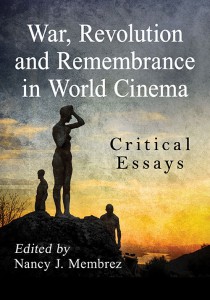War, Revolution and Remembrance in World Cinema
Critical Essays
Edited by Nancy J. Membrez


Average rating: ![]()
| 0 | rating | |
| 0 | rating | |
| 0 | rating | |
| 0 | rating |
Your rating: -
Book Presentation:
Two World Wars engulfed Europe, Asia and the United States, leaving indelible scars on the landscape and survivors. The trauma of civil wars in Spain (declared) and Latin America (tacit) spanned decades yet, contradictorily, bind parties together even today. Civil wars still haunt Africa where, in more recent years, ethnic cleansing has led to wholesale genocide. Drawing on the emerging field of Memory Studies, this book examines narrative and documentary films, made far from Hollywood, that address memory—both traumatic and nostalgic—surrounding these conflicts, despite attempts by special interests to erase or manipulate history.
About the Author:
Nancy J. Membrez is a professor of Spanish literature, culture, and Spanish and Latin American cinemas, as well as film production, at the University of Texas at San Antonio. She wrote the English subtitles for four Subiela films and produced three featurettes for the Kino Lorber DVD/Blu-ray of Man Facing Southeast. Her own film Portrait in Sepia Tone won Best Picture and Best Soundtrack at the International Filmmakers’ Film Festival in Kent, England, in 2008. She lives in San Antonio, Texas.
> From the same author:
> On a related topic:
One World, Big Screen (2016)
Hollywood, the Allies, and World War II
Screen Culture in the Global South (2024)
Cinema at the End of the World
Dir. Antonio Traverso, Deane Williams and Keyan G. Tomaselli
The Korean War and Postmemory Generation (2023)
Contemporary Korean Arts and Films
Reframing Remembrance (2021)
Contemporary French Cinema and the Second World War
Post-Yugoslav Cinema and the Shadows of War (2025)
A Study of Non-Representation in Film
Subject: Sociology
Nightmares in the Dream Sanctuary (2019)
War and the Animated Film
Traumatic Imprints (2018)
Cinema, Military Psychiatry, and the Aftermath of War
by Noah Tsika
Subject: Sociology